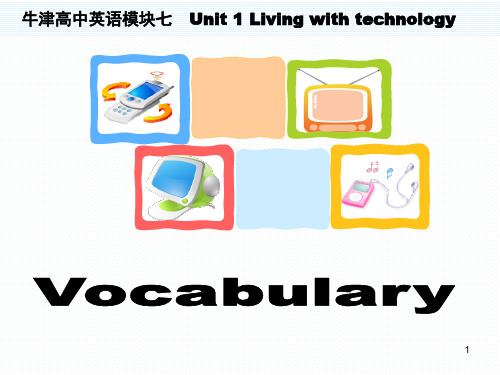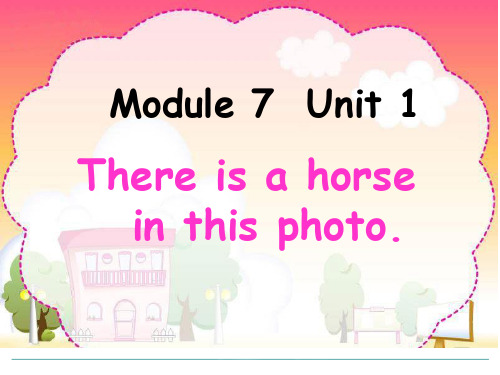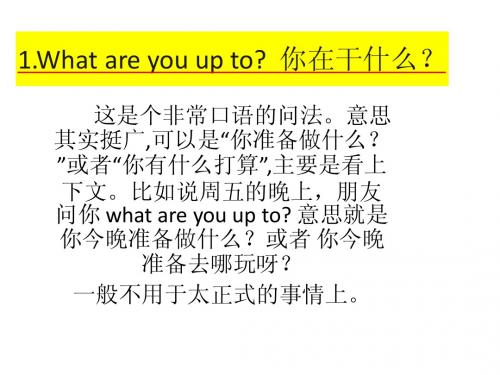M7U1课件
合集下载
外研版九年级英语上M7 U1课件

b) He is not as well known as the other two people, but his works are still popular.
c) His plays are read by millions of people.
d) He was more a teacher and thinker than a writer.
1 We're still influenced by Confucius's ideas. 2 Shakespeares plays also make a lot of sense to us today. 3 He was important, but I suppose he isn't as
e.g. I can’t find my watch. It may be in your pocket. 我找不到我的手表了,它可能在你的口袋里。
3. make a lot of sense to … 对……有重要意义 4. by the way 顺便说一下 5. I suppose that … 我认为 6. as … as 和……一样
Most of us think…We think we learn…
汉译英。
Practice
1.怎么啦?出什么事了? 1. What’s up?
2.列……的清单
2. make a list of
3.对……有重要意义 3. make a lot of sense to …
4.顺便说一下 5.为什么不……?
Key Points
1. What’s up? 怎么啦?出什么事了? 2. maybe 或许
副词,在句中作状语,相当于perhaps,常位于句首。 Maybe she’ll come this afternoon. 她可能今天下午来。
c) His plays are read by millions of people.
d) He was more a teacher and thinker than a writer.
1 We're still influenced by Confucius's ideas. 2 Shakespeares plays also make a lot of sense to us today. 3 He was important, but I suppose he isn't as
e.g. I can’t find my watch. It may be in your pocket. 我找不到我的手表了,它可能在你的口袋里。
3. make a lot of sense to … 对……有重要意义 4. by the way 顺便说一下 5. I suppose that … 我认为 6. as … as 和……一样
Most of us think…We think we learn…
汉译英。
Practice
1.怎么啦?出什么事了? 1. What’s up?
2.列……的清单
2. make a list of
3.对……有重要意义 3. make a lot of sense to …
4.顺便说一下 5.为什么不……?
Key Points
1. What’s up? 怎么啦?出什么事了? 2. maybe 或许
副词,在句中作状语,相当于perhaps,常位于句首。 Maybe she’ll come this afternoon. 她可能今天下午来。
外研版九年级英语上册M7U1课件ppt

埃里克森称他是“足球场上最好的球 员”。
在日常生活中,随处都可以看到浪费 粮食的 现象。 也许你 并未意 识到自 己在浪 费,也 许你认 为浪费 这一点 点算不 了什么
这句话里的more … than …表示 “与其说 是…不如说是…”,肯定more后面的,否定 than后面的。
1 He is more lucky than clever. 与其说他聪明,不如说他幸运。
2 He is more a scholar than a teacher. 与其说他是位教师,不如说是位学者。
3 Success is __m__o_r_e__ hard work _t_h_a__n___ good luck. 成功来自努力,而非运气。
在日常生活中,随处都可以看到浪费 粮食的 现象。 也许你 并未意 识到自 己在浪 费,也 许你认 为浪费 这一点 点算不 了什么
C. experience D. sense
在日常生活中,随处都可以看到浪费 粮食的 现象。 也许你 并未意 识到自 己在浪 费,也 许你认 为浪费 这一点 点算不 了什么
7. …, but I suppose he isn’t as well-known as Confucius or … suppose v. 猜想;猜测;相信;认为 1 As she's not here, I suppose she must have gone home. 因为她不在这儿, 所 以我猜想她一定已回家了。 2 What makes you suppose that I'm against it? 你根据什么推测我反对这事?
2. What’s up?
What’s up?这个句型是“怎么了?/出了 什么事”的意思。也可以是打招呼方式, 问对方近来如何。
在日常生活中,随处都可以看到浪费 粮食的 现象。 也许你 并未意 识到自 己在浪 费,也 许你认 为浪费 这一点 点算不 了什么
这句话里的more … than …表示 “与其说 是…不如说是…”,肯定more后面的,否定 than后面的。
1 He is more lucky than clever. 与其说他聪明,不如说他幸运。
2 He is more a scholar than a teacher. 与其说他是位教师,不如说是位学者。
3 Success is __m__o_r_e__ hard work _t_h_a__n___ good luck. 成功来自努力,而非运气。
在日常生活中,随处都可以看到浪费 粮食的 现象。 也许你 并未意 识到自 己在浪 费,也 许你认 为浪费 这一点 点算不 了什么
C. experience D. sense
在日常生活中,随处都可以看到浪费 粮食的 现象。 也许你 并未意 识到自 己在浪 费,也 许你认 为浪费 这一点 点算不 了什么
7. …, but I suppose he isn’t as well-known as Confucius or … suppose v. 猜想;猜测;相信;认为 1 As she's not here, I suppose she must have gone home. 因为她不在这儿, 所 以我猜想她一定已回家了。 2 What makes you suppose that I'm against it? 你根据什么推测我反对这事?
2. What’s up?
What’s up?这个句型是“怎么了?/出了 什么事”的意思。也可以是打招呼方式, 问对方近来如何。
m7u1单词讲解ppt课件

delay paying their bills.
一般来说,大公司不拖延支付他们的账单。
My doctor advised me to give up smoking
without delay.
5
• 只能接动名词做宾语的记忆口诀: • 考虑建议盼原谅,承认推迟没得想 • consider, suggest/advise,look forward to,
Only a few people have access to the full facts of the case. 只有少数几个人能看到有关该案的全部真实材料。 The website also gives access to a large number of tools that can be used to analyze these data. 这个网站还提供了大量能够分析这些数据的工具。
We lost touch with him after graduation. 我们毕业后就和他失去了联系。
The children should not be taught out of touch with reality. 孩子们不应该脱离现实教育。
3
2.construct vt. 制造,修筑,建造 Does the government have the responsibility to construct public libraries? 政府有责任建造公共图书馆吗?
They will distribute the books to the students in the flooded area. 他们将把这些书分给洪灾地区的学生们。
9
阅读下列句子,并理解:
7. They had distributed the lands among the peasants.
外研版三年级英语上M7U1课件

• 发言稿:Good morning,boys and girls!How are you? My name is ___.I'm __(几岁)__.I'm a____(小学生).This is my ____(学校).This is my _____(教室).This is my____(英语) ____(教 师).Thank you.
Module 7 Unit 1
What's this?
Let's sing Please stand up.
3
Revision(复习)
Free talk(自由交流)
Good morning. I'm_____.
How are you ? How old are you?
What's this?
• 欢迎各位现场观众,用英语提问。
• 如:What’s this?
单词: English ,teacher,pupil,school,classroom. 句型:
This is my________. What's this? It's a________.
9
1:向你的家人 介绍自己的物品
►为你理想的人,否则,爱的只是你在他身上找到的你的影子。 ►有时候,我们愿意原谅一个人,并不是我们真的愿意原谅他,而是我们 不愿意失去他。不想失去他,惟有假装原谅他。不管你爱过多少人,不管 你爱得多么痛苦或快乐。最后,你不是学会了怎样恋爱,而是学会了,怎 样去爱自己。
►为你理想的人,否则,爱的只是你在他身上找到的你的影子。 ►有时候,我们愿意原谅一个人,并不是我们真的愿意原谅他,而是我们 不愿意失去他。不想失去他,惟有假装原谅他。不管你爱过多少人,不管 你爱得多么痛苦或快乐。最后,你不是学会了怎样恋爱,而是学会了,怎 样去爱自己。
Module 7 Unit 1
What's this?
Let's sing Please stand up.
3
Revision(复习)
Free talk(自由交流)
Good morning. I'm_____.
How are you ? How old are you?
What's this?
• 欢迎各位现场观众,用英语提问。
• 如:What’s this?
单词: English ,teacher,pupil,school,classroom. 句型:
This is my________. What's this? It's a________.
9
1:向你的家人 介绍自己的物品
►为你理想的人,否则,爱的只是你在他身上找到的你的影子。 ►有时候,我们愿意原谅一个人,并不是我们真的愿意原谅他,而是我们 不愿意失去他。不想失去他,惟有假装原谅他。不管你爱过多少人,不管 你爱得多么痛苦或快乐。最后,你不是学会了怎样恋爱,而是学会了,怎 样去爱自己。
►为你理想的人,否则,爱的只是你在他身上找到的你的影子。 ►有时候,我们愿意原谅一个人,并不是我们真的愿意原谅他,而是我们 不愿意失去他。不想失去他,惟有假装原谅他。不管你爱过多少人,不管 你爱得多么痛苦或快乐。最后,你不是学会了怎样恋爱,而是学会了,怎 样去爱自己。
外研社四年级英语上册M7U1-课件

three
four
photo1:
There is a_h_o_rs_e in this photo. It's_ru_n_n_in_g_ fast.
photo2
There is a _sh_e_e_p_in this photo. It's_e_a_ti_n_g v_e_g_e_ta_b.les
孩期
子不
是一
菊样
花,
,有
选的
择孩
在子
秋是
天牡
开丹
放花
;,
而选
有择
的在
孩春
➢ He who falls today may rise tomorrow.
择孩
在子
冬是
天荷
开花
放,
选
择
在
夏
我们,还在路上……
photo3 There is a _c_a_t.It's_c_li_m_in_g a tree
photo4 It's_L_in_g_li_ng. She's_r_id_in_g_.a horse.
Listen and repeat (跟读)
Read by yourself (自读课文)
Read in role (分角色朗读)
Let's talk
There is _______ in this photo. It's______.
There is _______ in this photo. It's______.
There is _______ in this photo. He's______.
Module 7 Unit 1
M7 U1 课件

听力练耳
1.Do the chocolate cookies taste sweet? Yes, they do. 2.Where is Sally from? She is from London.
Listen again and do T or F questions.
1.The pizza doesn’t smell delicious. smells 2. The cheese doesn’t smell fresh.
Module7 Unit1 That smells delicious!
词汇朗读
1.表示感觉和知觉的系动词 look 看,看起来 sound听起来 feel摸起来,感觉 smell 闻,闻起来 taste尝,尝起来 2.形容词:quiet 安静的,轻声的 salty 咸的 sour酸的 tight(衣物)过紧的 fresh新鲜的 lovely 可爱的 smart漂亮的,时髦的 pretty 漂亮的 soft 柔软的 strong强壮的,味浓的 3.名词: feeling情绪,感觉 impression 印象 shoe 鞋 soup 汤 cookie小甜饼 try 尝试 sweater毛衣
今天Tom要举行生日聚会,他的朋友都来参加并 要举行生日聚会, 今天 要举行生日聚会 且带来了自己准备的礼物, 比萨饼, 且带来了自己准备的礼物 Jenny---比萨饼, 比萨饼 Amy---奶酪 奶酪,Mike---鲜花。 鲜花。 奶酪 鲜花 要求: 要求: 1.组织一个他们正在谈论礼物的对话 组织一个他们正在谈论礼物的对话。 1.组织一个他们正在谈论礼物的对话。 2.参考词汇: 2.参考词汇: 参考词汇 动词: 动词:look, sound, smell, taste, feel. 形容词: 形容词:comfortable, delicious, sweet, nice, beautiful, sour, smart/ pretty.
M7 u1课件

• 5.Ibet you do! I • 我打赌你一定想拍一些照片的。 我打赌你一定想拍一些照片的。 • 句中的do 是一个助动词,do的具体意 do的具体意 中的do 是一个 思要根据前文的动词而定。 思要根据前文的动词而定。 • 如: • A:I don't like her. 我不喜欢她。 我不喜欢她。 B:I bet you do. 我敢打赌你是喜欢她的。 我敢打赌你是喜欢她的。
随堂检测二: 随堂检测二:单项选择
• ( )1. I can’t carry the box. Can you________? • A. give me B. give me a hand C. give me two hands D. give me hands • ( )2. May I ______ your new watch? • A. have a look B. give a look at C. have a look at D. try a look at • ( )3. _______ feed on grass, so they are green. • A. Tigers B. A sheep C. Sheep D. Ships • ( )4. I’m looking for the wallet _______ I lost yesterday. • A. that B. who C. what D. this
随堂检测一.根据汉语意思补全句子。
• 1. 在我们从峨眉山回来的路上,我们的车旁一直有许多蹦跳 在我们从峨眉山回来的路上, 的猴子。 的猴子。 • There were a lot of monkeys ___________________________________. • 2. 在公园有一艘三面环水的巨型渔船。 在公园有一艘三面环水的巨型渔船。 • There is a huge sailing boat ___________________________ in the park. • 3. 昨天10点许多人在给一条鲨鱼照相。 昨天 点许多人在给一条鲨鱼照相。 点许多人在给一条鲨鱼照相 • __________________________________ at ten yesterday. • 4. 我想在学校舞会上拍些照片。 我想在学校舞会上拍些照片。 • I want to _______ some photos _______ the school dance. • 5. 你能帮我搬一下这个很重的箱子吗 你能帮我搬一下这个很重的箱子吗? • Can you give me _______ _______ to carry the heavy box?
M7U1 完整课件

look
Lovely/naughty
--How does the baby look?
--He looks lovely/naughty.
What does he look like?
strong He looks ______.
strong
--How does she look? --She looks beautiful.
comfortable
How does the dog feel?
(摸起来,感觉)
It feels comfortable .
How do the shoes feel? They feel tight.
tight
nervous.
How does he feel? He feels nervous.
5. I see what you mean!
我明白你的意思。 see在此处相当于understand。 I can’t see why he is so angry. 我不明白他为什么这么生气。 what you mean是一个名词性从句作 see的宾语。
6. Sure we will. 我们当然会了。 will在这里用作情态动词,表示愿意 做某事,也是一种允诺。 I will help you if you have difficulties. 如果你有困难我愿意帮助你。
3.Tony thinks the girls look smart because they are wearing nice clothes _______________________________. 4. They’re getting the food ready before they go to meet Sally at the airport _______________________________. 5. When they come back from the airport they’re going to have something to eat _______________________________.
